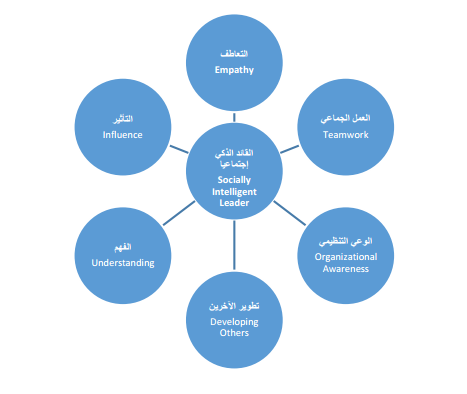دور الذكاء الاجتماعي في إدارة الصراع التنظيمي: دراسة أستطلاعية لآراء عينة من الهيأة التدريسية في جامعة الكوفة / كلية الإدارة والأقتصاد
الكلمات المفتاحية:
الذكاء الاجتماعي، إدارة الصراع التنظيميالملخص
تناول هذا البحث تقييم مستوى الذكاء الاجتماعي للقيادة الجامعية العليا في المؤسسات التعليمية وعلاقته في أساليب إدارة الصراع التنظيمي ، وأختبر هذا البحث في قطاع التعليم العالي بأختيار جامعة الكوفة / كلية الإدارة والإقتصاد ( نموذجاً ) لقد تبنى الباحثين أسلوب العينة (العشوائية) والتي ضمت عدد من التدريسين والبالغة (40) من مجموع (82) وبنسبة (%50) ، وقد أهملت (8) أستمارات وأقتصرت العينة في (32) أستمارة ، وأستخدم الأستبيان كأداة رئيسية لجمع البيانات المطلوبة ، ولغرض تحقيق هدف البحث تم أعتماد الفرضيات الرئيسة والفرعية التي تعكس العلاقة بين الذكاء الاجتماعي وأساليب إدارة الصراع التنظيمي وتم أختبار الفرضيات بين المتغيرات باستخدام نظام (SPSS) في الحاسب الإلكتروني ( الوسط الحسابي ، الانحراف المعياري ، معامل أرتباط بيرسون ) ، وبناءاً في نتائج التحليل تم التوصل الى مجموعة من الاستنتاجات التي تمثلت أن للذكاء الاجتماعي علاقة أرتباط وتأثير ذات دلاله معنوية بأساليب إدارة الصراع التنظيمي ، كما قدم البحث عدد من التوصيات التي أكدت في ضرورة تطوير القدرات الستراتيجية للقيادات الجامعية في مجال توظيف تقنيات الذكاء الإجتماعي في جميع الممارسات والقرارات وبما يسهم في إدارة الصراع التنظيمي.
المراجع
A- Books
- Bratton J & Gold J. ( Human Resource Management : Theory and Practice )
th ed New York , Palgrave , Macmillan,2003.
- Cohen, J., and Cohen, P. (Applied Multiple Regression/ Correlation Analysis for
the Behavioral Sciences) 2nd Ed. New York: Lawrence Erlbaum Associates 1983.
- Dewberry, C. (Statistical Methods for Organizational Research : Theory and
practice) First published, Published in the Taylor & Franci, 2004.
- Field, A., (Discovering statistics using SPSS), 2nd edition. London : Sage. 2005.
- Hair, J., Anderson , R., Tatham, R. & Black, W. (Multivariale Data Analysis), 5h
Edition, Pearson Education Inc., India ., 1998.
- Harrington, D. (Confirmatory Factor Analysis). Oxford University Press, Inc.,
- Nunnaly, J.C. & Bernstein, I.H.. (Psychometric theory). New York: McGraw-
Hill, (1994).
- Tajfel, H. and Turner, J.C. (An integrative theory of social conflict)2nd edition
The Social Psychology of Inter-Group Relations,. Chicago: Nelson Hall, 1979.
B- Journals & Periodicals
- Ashforth, B.E.; Mael, F.A. (Social identity and the organization). Academy of
Management Review, 14 (1): 20-39, 1989.
- Ashforth, E.B.; Harrison, H.S. ; Corley, G.K. (Identification in organization: An
examination of four fundamental questions) Journal of management, 34. (3),
- Bartels, J. (Organizational Identification And Communication: Employees
evaluations of internal communication and its effect on identification at different
organizational levels) university of twente, 2006.
- Bartholomew, D. J. (The Statistical Approach to Social Measurement), USA:
Academic Reas. Inc, 1996.
- Chan, F., Lee, G., Lee, E., Kubota, C., & Allen, Ch., (Structural Equation
Modeling in Rehabilitation Counseling Research, Rehabilitation Counseling
Bulletin), 51:1, 53-66. 2007.
- Coyne, Erin E. ( Reputation as information; Amultilevel Approach to reputation
in organization ) presented in partial of the requirements for the degree doctor of
philosophy in the Graduate school of the ohio state university 2010
- Ekmekci, O.; Casey, A. (How time brigs together "I" and "We": A theory of
identification through memory) Institute of behavioral and applied management,
- Elsbach, K. D., & Bhattacharya, C. B. (Defining who you are by what you're
not: organizational disidentification and the National Rifle Association) journal
of Organizational Science, 393-413, 2001.
- Galliers, D., R. (Choosing appropriate information systems research approaches:
a revised taxonomy) European Journal of information systems, 1991.
- Hameed, I.; Ghulam Ali A.; Roques, O. (extending the model of antecedents and
outcomes of organization identification in Pakistani context) Institut
d'Administration des entreprises, France, 2011.
- Hinkin, T. R. (A Review of Scale Development Practices in the Study of
Organizations). Journal of Management, 21, 967-988, 1995.20- Johnson, D. M.; Morgeson, P. F. ( Cognitive and Affective identification in
organizational settings) Michigan state university, 2008.
- Mael, F.; Ashforth, B. (Alumni and their alma mater; A partial test of the
reformulated model of organization identification) Journal of organizational
behavior, vol,13,103-123, 1992.
- Tyler, R. T.; Blader, L. S. (Autonomous Vs. Comparative Status; Must We be
better than others to feel good about ourselves?) Procedural Justice & Status in
organizations, 2002.
- Tyler, T. R.; Blader, S. L. (The group engagement model: Procedural justice,
social identity, and cooperative behavior). Personality and Social Psychology
Review, 7, 349–361. (2003)
- Witting, M. (Relations between organizational identity, identification and
organizational objectives: An empirical study in municipalities) Universiteit
Twente, Enschede, 2006.

التنزيلات
منشور
كيفية الاقتباس
إصدار
القسم
الرخصة
الحقوق الفكرية (c) 2013 كلية الإدارة والإقتصـــاد _ جامعة كربـــلاء

هذا العمل مرخص بموجب Creative Commons Attribution-NonCommercial-NoDerivatives 4.0 International License.
يحتفظ المؤلفون بحقوق الطبع والنشر لأوراقهم دون قيود.









